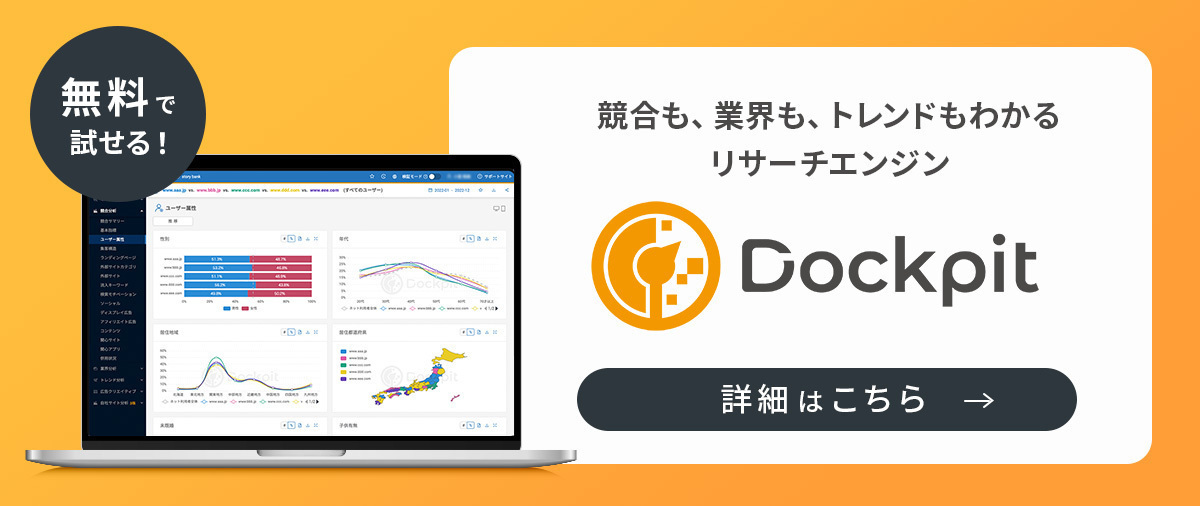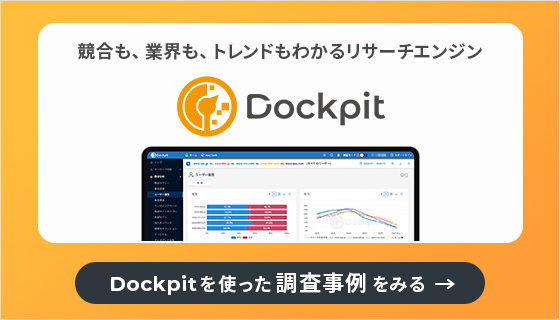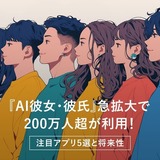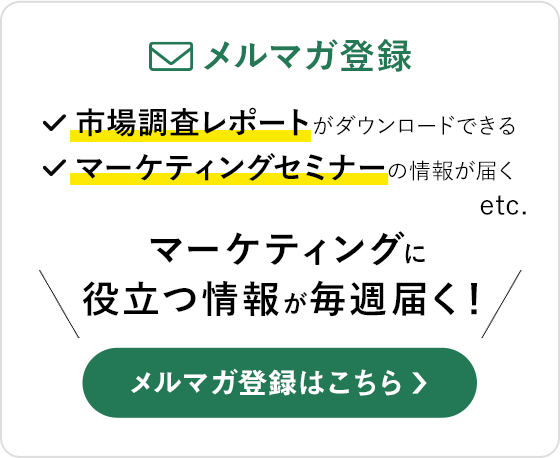The number of people searching “analysis” has been consistently around 150,000 per month for the past two years
List of articles regarding movies on “RENOTE”
In recent years, you may have noticed that you have been hearing or seeing the word “analysis” more frequently.
The definition of “analysis” is “to do a lot of investigating and thinking in order to clarify,” and a culture of analyzing, particularly TV dramas, movies, games, etc., is emerging. This is a way of enjoying something by “analyzing the meaning of the story or the characters’ lines, future progression, etc., and combining it with previous plots, foreshadowing, and other knowledge.”
Who is interested in “analysis” and how are they acting on that interest? Let's take a look at the data that will help break down and interpret the situation. For the analysis, we will use VALUES’ online behavioral log analytics tool “Dockpit,” which uses data that is updated monthly to analyze competitors’ websites and research trends, accessible all within the browser.
First, the graph below shows the change in the number of people searching for the word “analysis” over the span of the past two years.

Changes in the number of people searching “analysis”
Period: April 2022 - March 2024
Devices: PC & smartphone
We can see that over 150,000 people searched “analysis” consistently over the span of the period. In addition, as interest in the term periodically increased, it is likely that the content that is the subject of the “analysis” changes from time to time.
A wide range of entertainment works, including dramas, anime, and games, are “subjects of analysis”
Next, we will analyze the content that is the subject of “analysis.” The following table shows the rankings of keywords searched in combination with “analysis.”

Ranking of keyword searched in combination with “analysis”
Period: April 2022 - March 2024
Devices: PC & smartphone
From this table, we can see that somewhat abstract nouns such as “movies,” “lyrics,” and “games” rank high. In addition, titles of works from various genres, such as TV dramas and anime, rank high.
Below is a list of the titles and genres of the works. From this, we can see that there is a wide range of genres that are a subject of “analysis” content.
TV dramas: “VIVANT,” “My Family,” “Saiko no Kyoshi”
TV anime: “Attack on Titan”
Anime movies: “One Piece,” “The Boy and the Heron”
Game: “Elden Ring”
Next, let's look at the relationship between “lyrics” and “analysis,” which are ranked second among keyword combinations.
In recent years, popular Japanese songs have become more and more full of words that are difficult to understand after just one listen, and lyrics with complex meanings. People who want to understand such lyrics are likely searching for things like “song title lyrics analysis.”
People also seem to be searching for lyrics of songs in foreign languages, such as K-Pop and Western music. Those who want to quickly find out the meaning of the lyrics explained in Japanese may be searching for “analysis.”
Young people in their 20s and 30s account for about 60% of people searching for “analysis”
Next, we will analyze what type of people are interested in “analysis.”
First, let's look at people searching for “analysis” by gender. From the graph below, we can see that there is almost no difference in gender among people searching for “analysis.” Since “analysis” covers a wide range of content, it is enjoyed by both men and women.

People searching “analysis” by gender
Period: April 2022 - March 2024
Devices: PC & smartphone
What is the age distribution of people searching “analysis”? According to the graph below, young people in their 20s and 30s account for about 60% of people searching “analysis.”

People searching “analysis” by age group
Period: April 2022 - March 2024
Devices: PC & smartphone
As we saw in the previous chapter, the different content that are the subject of the study, such as movies, games, dramas, and songs, are mainly ones that are new and popular at the time. Therefore, it is thought to have a high affinity with young people, who are more likely to be keep up with new content. When young people analyze new content, it may become a hot topic, leading to an even wider range of people analyzing it.
Next is the percentage of people who searched “analysis” by marital status.

People searching “analysis” by marital status
Period: April 2022 - March 2024
Devices: PC & smartphone
The following graph shows that more than 70% of people searching for “analysis” are unmarried. Considering that 60% of people searching for “analysis” are in their 20s and 30s, this is a reasonable result.
It is thought that the proportion of unmarried people living alone is relatively high. Such people may search for “analysis” when they want to share their opinions with someone about a certain piece of content or want to know other people's interpretations.
■Are people searching to find an interpretation right after a TV drama aired?
Let’s also look at the time of day that people are searching “analysis.”
As you can see from the graph below, searches peak at 10:00 p.m. Since 10:00 p.m. is at the end of a time frame when TV stations like to broadcast their major TV dramas, it is likely that many people search for the interpretation of the episode immediately after watching it, wanting to know how others understand the episode.

Time of day that people are searching “analysis”
Period: April 2022 - March 2024
Devices: PC & smartphone
Platforms for user-generated content is spreading the culture of “analysis”
Next, we will look at what kind of websites people who search for “analysis” are visiting.
The following table shows the ranking of websites that attracted users searching for “analysis.” As you can see from this chart, media platforms for user-generated content such as “note,” “Ameba Blog,” and “RENOTE” ranked high.

Ranking of websites attracting people searching “analysis”
Period: April 2022 - March 2024
Devices: PC & smartphone
“note” is a media platform operated by note, inc. made for content creators and their supporters. “Ameba Blog” is one of Japan's largest blogging websites, operated by CyberAgent Inc., and is characterized by its wide range of blog designs.
“RENOTE” is a media platform operated by DoubleDown Inc. that promotes itself as “a guidebook for pop culture and entertainment created by everyone.” It is characterized by its focus on the entertainment category.
Top page for the PC website for “RENOTE”
Next, let's look at how many articles related to “analysis” have been posted on each media platform. When “analysis” was searched using the search box on each media platform, the number of articles that came up was as follows:
note: Approximately 10,000 articles
Ameba Blog: Approximately 1,800 blog titles and approximately 50,000 articles
RENOTE: Approximately 160,000 articles
These results show that these media outlets do indeed post a large amount of content related to “analysis.”
All of these media platforms are characterized their user-generated content that allow users to express their opinions in writing. By writing down their “analysis,” users can process and sort out their own thoughts. And by sharing them, users can see others’ reactions and the different opinions, which helps further deepen their “analysis.”
Are the demographics for people searching “analysis,” “spoilers,” and “synopsis” different?
Lastly, let's look at search words similar to “analysis” (words that are searched for in a similar way). The following table shows the ranking of words similar to “analysis.”

Ranking of similar words as “analysis”
Period: April 2022 - March 2024
Devices: PC & smartphone
From this table, we can see that the number of users who searched for “spoiler” and “synopsis” was particularly high. So how do people who search “spoiler” and “synopsis,” which are similar words to “analysis,” think differently from those who search for “analysis”?
Let's compare the rate of keyword combined use (the percentage of people searching both search terms).
First, let's look at the rate at which “analysis” and “spoiler” are searched together.

Venn diagram of the combined use for “analysis” and “spoiler”
Period: April 2022 - March 2024
Devices: PC & smartphone
The combined Venn diagram above shows that people who search for both “analysis” and “spoiler” account for 13.4% of the total, which is not a very high percentage.
Similarly, let's look at the “analysis” and “synopsis” in the same way.

Venn diagram of the combined use for “analysis” and “synopsis”
Period: April 2022 - March 2024
Devices: PC & smartphone
We found that only 10.6% of people searched for both, which is not a very high percentage.
From these points, we can surmise that even if similar keywords are searched together, the people searching are different. In general, “analysis” content tends to interest people who already know a certain amount on the subject, while “spoilers” and “synopsis” are often searched for by people who know very little about the content and want to quickly find out what it is about. We mentioned earlier that “analysis” searches were most common around 10:00 p.m., right after the broadcasting of the TV drama ends, and we can see a trend of “analysis” searches being used to find deeper interpretations.
Summary
In this article, we have analyzed the “analysis” content from various perspectives.
Many of those who search for “analysis” are young men and women in their 20s and 30s, who are trend-conscious and quicker when it comes to keeping up with new things. “Analysis” covers a wide range of entertainment-related content. User-generated content, where people can clearly express their personal opinions, has become popular as a place for “analysis.” Furthermore, it is believed that many people who are interested in “analysis” are already familiar with the subject of analysis to some extent.
“Analysis” is thought to be a new way of enjoying content among young people. The best part of “analysis” content is that it allows you to enjoy your favorite works/topics on a deeper level by combining it with knowledge and experiences outside of the subject itself, rather than simply enjoying it. Another factor behind the popularity of “analysis” is the wide range of ways it can be enjoyed, whether online or in real-life conversations, and whether it can be enjoyed alone or with others.
Content that stimulates the desire to “analyze” will likely continue to appear in the future, continuing to create new groups of people who love “analyzing.”
About Dockpit
▼Data from Dockpit was used in this case study. Dockpit is an online behavior analytics tool provided by VALUES, Inc., and it allows you to access online behavioral data (updated monthly) via your browser so you can research competitor websites and investigate trends. There is a FREE version of Dockpit, so if you are interested in using it, please register below.
※日本語での記事はこちらをご確認ください

若者層に広がるコンテンツの「考察」ブーム。検索データの分析からその思考に迫る
https://manamina.valuesccg.com/articles/3361ここ数年でよく耳にする、コンテンツへの「考察」。若年男女の間で特に人気になっています。対象となるコンテンツは幅広く、自分の意見を文章で表現できるメディアが「考察」の場として人気を集めています。「ネタバレ」「あらすじ」の検索者とは異なる「考察」人気の背景を、データから探ります!






















Born and raised in the Bay Area, U.S.A, I was fascinated by the different social and purchasing behaviors between Japanese and American consumers. I studied communication for undergrad and international marketing for my graduate studies. My professional background is in bilingual recruitment and Japanese-English translation.